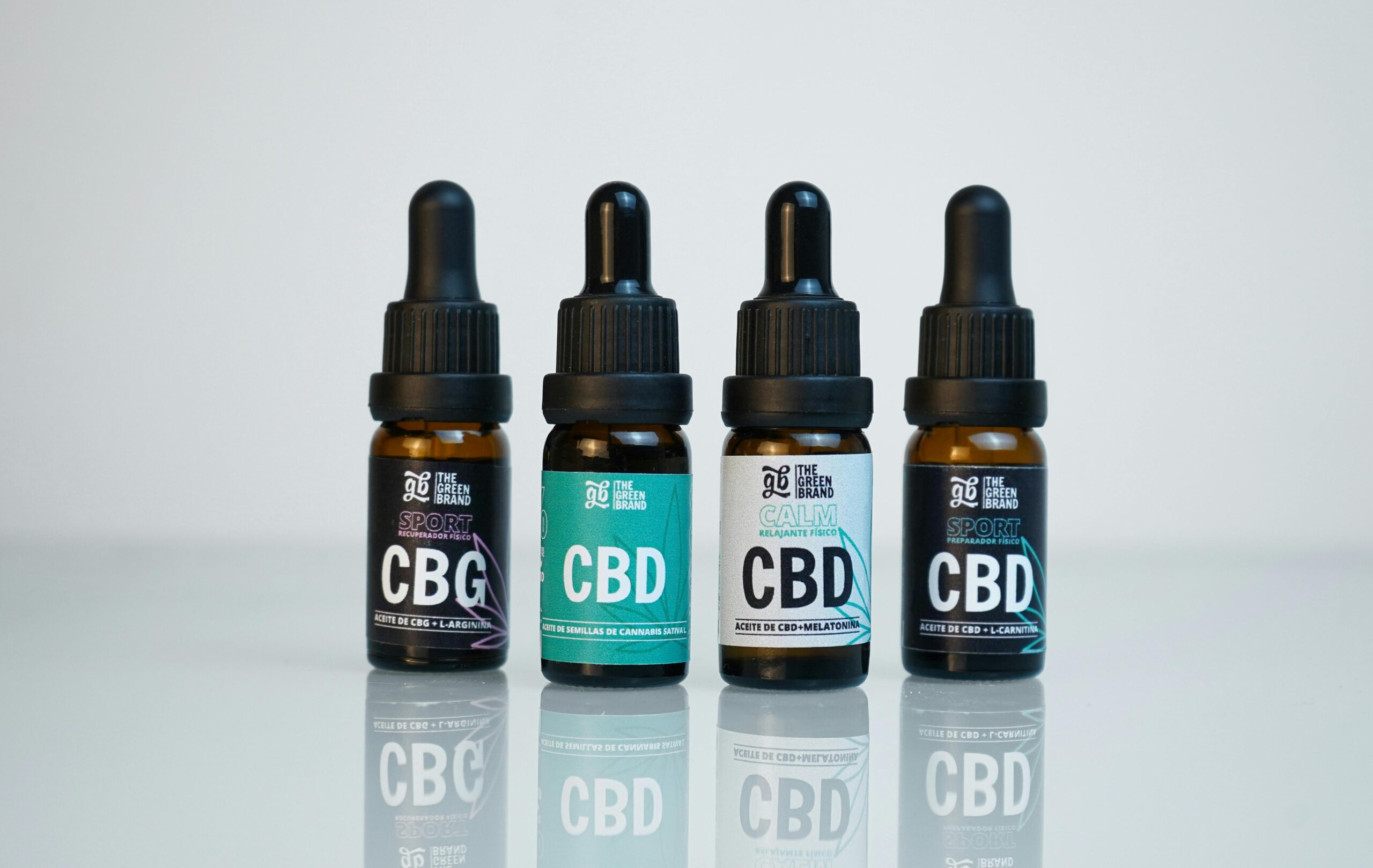The content on this blog is intended solely for informational purposes. It should not be construed as professional medical advice, diagnosis, or treatment, and it is not a substitute for consultation with a licensed healthcare professional. Readers are strongly encouraged to seek the counsel of a qualified healthcare provider with any questions or concerns they may have regarding a medical condition or treatment. Never disregard or delay seeking professional medical advice based on information obtained from this blog.

What are Cannabinoids?
Cannabinoids are a diverse group of compounds found in the cannabis plant, with tetrahydrocannabinol (THC) and cannabidiol (CBD) being the most well-known. THC is recognized for its psychoactive effects, whereas CBD is known for its potential therapeutic benefits without the ‘high’ (Izzo et al., 2009). Recently, interest has grown in exploring cannabinoids such as Cannabigerol (CBG) due to their potential health benefits, including their impact on gut health. ‘Exploring CBG for Gut Health: Uses and Benefits’ has become a focal point as researchers investigate how CBG and other lesser-known cannabinoids might address medical conditions such as chronic pain, anxiety, inflammation, and epilepsy.
The significant potential of CBG in reducing inflammation in inflammatory bowel diseases (IBD) is a reassuring development in cannabinoid research, offering hope and optimism for those suffering from these conditions (Perucca, 2017).
This increased interest is driven by expanding legal access to cannabis and a surge in research exploring its therapeutic potential (Volkow, Baler, Compton, & Weiss, 2014).
Scientists are examining cannabinoids like CBG for their possible benefits, particularly in the context of gut health (Andre, Hausman, & Guerriero, 2016). A significant focus is on how cannabinoids interact with the endocannabinoid system (ECS).The ECS is a complex cell-signaling system discovered in the early 1990s that plays a crucial role in regulating a range of bodily functions and processes, including mood, appetite, sleep, and immune response.
In gut health, the ECS regulates intestinal inflammation and the gut-brain axis, influencing stress and anxiety levels. As research progresses, cannabinoids are becoming a significant topic of interest for medical professionals and consumers seeking natural alternatives for health management.
Understanding Cannabigerol (CBG)
Cannabigerol (CBG), a ‘non-psychoactive’ cannabinoid found in the cannabis plant, is gaining attention for its unique properties. Unlike THC, it does not produce intoxicating effects, making it a promising candidate for health and wellness. This non-psychoactive nature of CBG provides reassurance and confidence in its potential use, offering a secure and informed perspective for those interested in its applications.
CBG is often referred to as the ‘mother cannabinoid’ because it is the precursor from which other cannabinoids, such as THC and cannabidiol (CBD), are synthesized. The cannabis plant initially produces cannabigerolic acid (CBGA), the acidic form of CBG. Through enzymatic processes, CBGA is converted into the acidic forms of other cannabinoids, such as tetrahydrocannabinol acid (THCA) and cannabidiolic acid (CBDA). These are then decarboxylated into their active forms, like THC and CBD, during the plant’s growth and as a result of heating.
Interest in CBG is growing due to its potential therapeutic properties. Research suggests that CBG may have various beneficial effects, including anti-inflammatory, antibacterial, and neuroprotective properties. However, it’s important to note that like any supplement, CBG may have potential risks or side effects, such as interactions with other medications or allergic reactions.
Therefore, it’s crucial to consult a healthcare professional before using CBG, especially if you’re taking other medications or have existing health conditions. While more research is necessary to understand CBG’s effects and benefits fully, it holds promise for use in health and wellness without the psychoactive effects associated with THC.
The Importance of Gut Health
Gut health is not just about digestion, it’s a crucial component of overall well-being. It plays a significant role in digestion, nutrient absorption, and immune function. A healthy gut microbiome—a complex community of trillions of bacteria and other microorganisms—is vital for maintaining balance in the digestive system, supporting metabolic processes, and protecting against harmful pathogens. When gut health is compromised, it can lead to various health issues and systemic inflammation, underscoring the urgency of maintaining a healthy gut for our overall well-being.
Common gut-related disorders include irritable bowel syndrome (IBS), inflammatory bowel disease (IBD) such as Crohn’s disease and ulcerative colitis, and dysbiosis, characterized by an imbalance in gut microbiota. These conditions can manifest as symptoms like chronic abdominal pain, bloating, diarrhea, and constipation, severely impacting quality of life. Additionally, there is growing evidence linking gut health to mental health, with conditions such as anxiety and depression associated with an unhealthy gut microbiome.
Several factors contribute to gut health, including diet, lifestyle, stress, and medications. Diets high in processed foods, sugars, and unhealthy fats can disrupt the microbial balance, while diets rich in fiber, fruits, vegetables, and fermented foods tend to support a healthy microbiome. Other factors like regular physical activity, sufficient hydration, and managing stress are also vital for maintaining gut health. Ultimately, prioritizing gut health is essential, as it is a foundation for overall wellness and influences multiple bodily systems.
CBG’s Role In Supporting Gut Health
Cannabigerol (CBG) is gaining recognition for its potential role in supporting gut health through various mechanisms, particularly its anti-inflammatory properties, antibacterial effects, and interaction with the endocannabinoid system (ECS).
Anti-Inflammatory Properties
CBG has demonstrated significant anti-inflammatory effects, which can be particularly beneficial for individuals suffering from inflammatory bowel diseases (IBD) such as Crohn’s disease and ulcerative colitis. Research suggests that CBG may inhibit inflammatory pathways and reduce the production of pro-inflammatory cytokines, thereby alleviating inflammation in the gut lining.
By mitigating inflammation, CBG can help restore balance to the gut environment, improving overall digestive health and potentially preventing further complications related to chronic inflammation.
Antibacterial Effects
In addition to its anti-inflammatory properties, CBG exhibits antibacterial effects that can enhance gut health. Research has shown that CBG can act against harmful bacteria, including those that may contribute to infections or dysbiosis in the gut.
By promoting the elimination of pathogenic bacteria while potentially fostering the growth of beneficial bacteria, CBG helps maintain a balanced microbiome—a critical factor for optimal gut health.
Endocannabinoid System (ECS) Interaction
CBG interacts with the endocannabinoid system (ECS), a vital regulatory system that maintains bodily homeostasis, including the gastrointestinal tract. The ECS consists of endocannabinoids, cannabinoids produced by the body, receptors (CB1 and CB2), and enzymes, which regulate various physiological processes such as appetite, digestion, and immune response.
CBG primarily interacts with the CB2 receptors, which are predominantly found in the immune system and gut. This interaction can modulate gut motility and pain sensation, further contributing to its potential benefits for digestive health.
Overall, CBG’s anti-inflammatory properties, antibacterial effects, and interaction with the ECS make it a promising candidate for supporting gut health. Continued research is needed to understand its mechanisms and therapeutic potential fully. However, early findings highlight CBG’s role as a key player in gut health and overall well-being.

Research and Evidence
Research on cannabigerol (CBG) has been gaining momentum. Several laboratory and animal studies have begun to elucidate the potential benefits of CBG, highlighting its anti-inflammatory and antibacterial properties and its interaction with the endocannabinoid system (ECS).
Key Findings from Recent Research
- Anti-Inflammatory Effects: A study by Borrelli et al. (2020) demonstrated that CBG can significantly reduce inflammation in animal models of colitis. In these models, CBG treatment decreased inflammatory markers and improved histological scores, suggesting its potential for managing inflammatory bowel diseases (IBD) like Crohn’s disease and ulcerative colitis.
- Antibacterial Properties: Research by Gertsch et al. (2021) indicated that CBG exhibits antibacterial activity against various pathogenic bacteria, including antibiotic-resistant strains. This suggests that CBG could play a role in maintaining a healthy gut microbiome by combating harmful bacteria.
- ECS Modulation: Maida et al. (2022) investigated CBG’s effects on the ECS and found that it interacts primarily with CB2 receptors, which are important for immune regulation within the gut. This interaction may mitigate gut-related inflammation and improve gut motility.
Limitations and Need for Further Research
Despite these promising findings, the current body of research has significant limitations. Most studies conducted thus far have been in vitro (lab-based) or in animal models, which do not translate directly to human physiology. For instance, the dosing, metabolic processes, and interactions with other human-specific factors may differ vastly between animals and humans.
Moreover, many studies have small sample sizes and varied experimental designs, making it challenging to draw definitive conclusions. Most research is still in its early stages. While the results are promising, they do not yet comprehensively understand CBG’s effects in human subjects.
To substantiate the potential therapeutic benefits of CBG for gut health, robust clinical trials assessing its safety, efficacy, and appropriate dosing in humans are urgently needed. Such studies will be crucial in addressing current gaps in knowledge and paving the way for the clinical application of CBG as a therapeutic agent for digestive disorders.
Forms of CBG
CBG is available in various forms, each offering different methods of consumption:
- Oils and Tinctures: Often taken sublingually for quicker absorption, oils and tinctures allow easy dosing adjustment.
- Capsules and Edibles provide a convenient way to consume CBG, with more precise dosing but potentially slower onset of effects due to digestion.
- Topicals: For localized relief, CBG-infused creams and balms are applied directly to the skin, bypassing systemic circulation.
Dosing and Quality
Determining the correct dosage of CBG can be challenging due to individual variations in metabolism, body weight, and specific health needs. It’s recommended to start with a low dose and gradually increase until the desired effects are achieved.
Quality is imperative when selecting CBG products. Consumers should look for third-party lab testing to verify purity, potency, and the absence of contaminants such as heavy metals and pesticides. Understanding the source of CBG is also essential, as organically grown cannabis may provide a purer product.
Legal and Safety Considerations
Although CBG is non-psychoactive and generally considered safe, it’s essential to be aware of the legal status in your region, as cannabis regulations can vary widely. Additionally, individuals should consider possible interactions between CBG and other medications, as cannabinoids can affect the metabolism of certain drugs.
Consultation and Monitoring
Consulting with a healthcare professional is advisable, especially for those with pre-existing conditions or those who are pregnant or nursing. Regular monitoring of the effects and adjusting the dosage as needed can help maximize benefits while minimizing risks.
Sources:
Borrelli, F., et al. (2020). Cannabigerol reduces inflammation in an experimental model of colitis. Journal of Medicinal Chemistry, 63(22), 7794-7808.
Gertsch, J., et al. (2021). Cannabinoids and bacterial infection: An update on the role of endocannabinoids in immunity. Frontiers in Pharmacology, 12, 651539.
Maida, V., et al. (2022). CBG as an anti-inflammatory agent: A focus on the endocannabinoid system. Frontiers in Immunology, 13, 823432.
Andre, C. M., Hausman, J. F., & Guerriero, G. (2016). Cannabis sativa: The Plant of the Thousand and One Molecules. Frontiers in Plant Science, 7, 19.
Izzo, A. A., Borrelli, F., Capasso, R., Di Marzo, V., & Mechoulam, R. (2009). Non-psychotropic plant cannabinoids: New therapeutic opportunities from an ancient herb. Trends in Pharmacological Sciences, 30(10), 515-527.
Perucca, E. (2017). Cannabinoids in the Treatment of Epilepsy: Hard Evidence at Last? Journal of Epilepsy Research, 7(2), 61–76.
Volkow, N. D., Baler, R. D., Compton, W. M., & Weiss, S. R. (2014). Adverse health effects of marijuana use. The New England Journal of Medicine, 370(23), 2219-2227.

The Best Ways to Naturally Reduce Methane in the Gut
The Best Ways to Naturally Reduce Methane in the Gut. This article explores The Best Ways to Naturally Reduce Methane in the Gut, offering proven strategies

The link between Leaky Gut Syndrome and Weight Gain
Facebook Threads The content on this blog is intended solely for informational purposes. It should not be construed as professional medical advice, diagnosis, or treatment,

The Connection Between Gut Health and Brain Fog
The Connection Between Gut Health and Brain Fog https://cortexcannibal.com/wp-content/uploads/2025/02/Untitled-design-1.mp4 “To keep the body in good health is a duty. Otherwise, we shall not be able

Exploring CBG for Gut Health Uses and Benefits
Facebook Pinterest The content on this blog is intended solely for informational purposes. It should not be construed as professional medical advice, diagnosis, or treatment,

The Connection Between Allergies and Heart Rate.
Your Heart and Allergies: Understanding the Connection and Managing Your Health” The content provided on this website is intended for informational purposes only and should

Natural Herbs for Great Dental and Oral Health Care.
Natural herbs for great dental and oral health care. Every tooth in a man’s head is more valuable than a diamond. — Miguel
"You are not stuck with the brain you have; you can make it better."
-Virgyl
